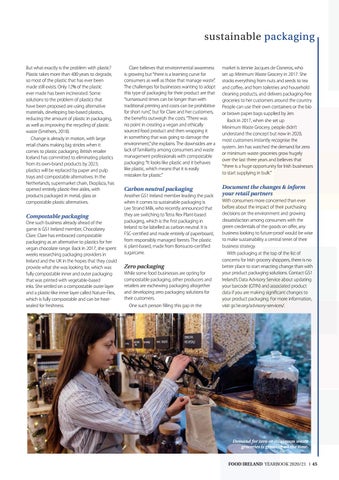sustainable packaging But what exactly is the problem with plastic? Plastic takes more than 400 years to degrade, so most of the plastic that has ever been made still exists. Only 12% of the plastic ever made has been incinerated. Some solutions to the problem of plastics that have been proposed are using alternative materials, developing bio-based plastics, reducing the amount of plastic in packaging, as well as improving the recycling of plastic waste (Smithers, 2018). Change is already in motion, with large retail chains making big strides when it comes to plastic packaging. British retailer Iceland has committed to eliminating plastics from its own-brand products by 2023; plastics will be replaced by paper and pulp trays and compostable alternatives. In the Netherlands, supermarket chain, Ekoplaza, has opened entirely plastic-free aisles, with products packaged in metal, glass or compostable plastic alternatives.
Compostable packaging One such business already ahead of the game is GS1 Ireland member, Chocolatey Clare. Clare has embraced compostable packaging as an alternative to plastics for her vegan chocolate range. Back in 2017, she spent weeks researching packaging providers in Ireland and the UK in the hopes that they could provide what she was looking for, which was fully compostable inner and outer packaging that was printed with vegetable-based inks. She settled on a compostable outer layer and a plastic-like inner layer called Nature-Flex, which is fully compostable and can be heatsealed for freshness.
Clare believes that environmental awareness is growing but “there is a learning curve for consumers as well as those that manage waste”. The challenges for businesses wanting to adopt this type of packaging for their product are that “turnaround times can be longer than with traditional printing and costs can be prohibitive for short runs”, but for Clare and her customers, the benefits outweigh the costs. “There was no point in creating a vegan and ethically sourced food product and then wrapping it in something that was going to damage the environment,” she explains. The downsides are a lack of familiarity among consumers and waste management professionals with compostable packaging: “It looks like plastic and it behaves like plastic, which means that it is easily mistaken for plastic.”
market is Jennie Jacques de Cisneros, who set up Minimum Waste Grocery in 2017. She stocks everything from nuts and seeds to tea and coffee, and from toiletries and household cleaning products, and delivers packaging-free groceries to her customers around the country. People can use their own containers or the bio or brown paper bags supplied by Jen. Back in 2017, when she set up Minimum Waste Grocery, people didn’t understand the concept but now in 2020, most customers instantly recognise the system. Jen has watched the demand for zero or minimum waste groceries grow hugely over the last three years and believes that “there is a huge opportunity for Irish businesses to start supplying in bulk.”
Carbon neutral packaging
Document the changes & inform your retail partners
Another GS1 Ireland member leading the pack when it comes to sustainable packaging is Lee Strand Milk, who recently announced that they are switching to Tetra Rex Plant-based packaging, which is the first packaging in Ireland to be labelled as carbon neutral. It is FSC-certified and made entirely of paperboard, from responsibly managed forests. The plastic is plant-based, made from Bonsucro-certified sugarcane.
Zero packaging While some food businesses are opting for compostable packaging, other producers and retailers are eschewing packaging altogether and developing zero packaging solutions for their customers. One such person filling this gap in the
With consumers more concerned than ever before about the impact of their purchasing decisions on the environment and growing dissatisfaction among consumers with the green credentials of the goods on offer, any business looking to future-proof would be wise to make sustainability a central tenet of their business strategy. With packaging at the top of the list of concerns for Irish grocery shoppers, there is no better place to start enacting change than with your product packaging solutions. Contact GS1 Ireland’s Data Advisory Service about updating your barcode (GTIN) and associated product data if you are making significant changes to your product packaging. For more information, visit gs1ie.org/advisory-services/.
Demand for zero or minimum waste groceries is growing all the time.
FOOD IRELAND YEARBOOK 2020/21 | 45
